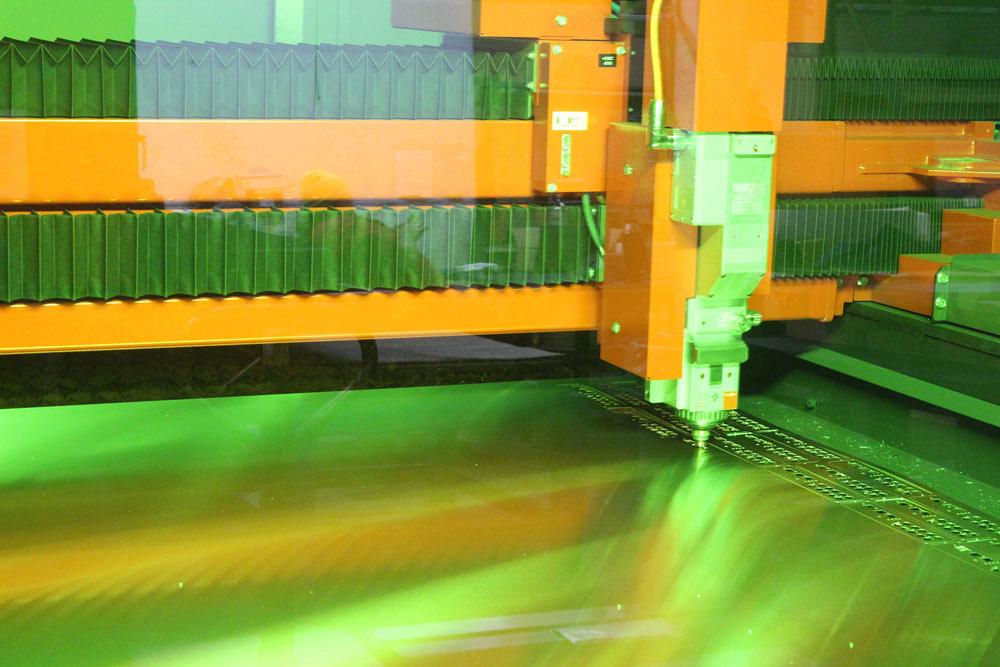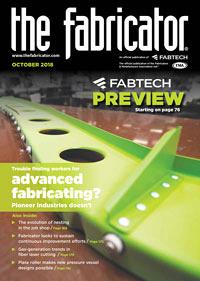Editor-in-Chief
- FMA
- The Fabricator
- FABTECH
- Canadian Metalworking
Categories
- Additive Manufacturing
- Aluminum Welding
- Arc Welding
- Assembly and Joining
- Automation and Robotics
- Bending and Forming
- Consumables
- Cutting and Weld Prep
- Electric Vehicles
- En Español
- Finishing
- Hydroforming
- Laser Cutting
- Laser Welding
- Machining
- Manufacturing Software
- Materials Handling
- Metals/Materials
- Oxyfuel Cutting
- Plasma Cutting
- Power Tools
- Punching and Other Holemaking
- Roll Forming
- Safety
- Sawing
- Shearing
- Shop Management
- Testing and Measuring
- Tube and Pipe Fabrication
- Tube and Pipe Production
- Waterjet Cutting
Industry Directory
Webcasts
Podcasts
FAB 40
Advertise
Subscribe
Account Login
Search
The fabricator that doesn’t struggle finding entry-level workers
When this contract manufacturer finds new employees, they find new hope
- By Dan Davis
- October 5, 2018
- Article
- Shop Management
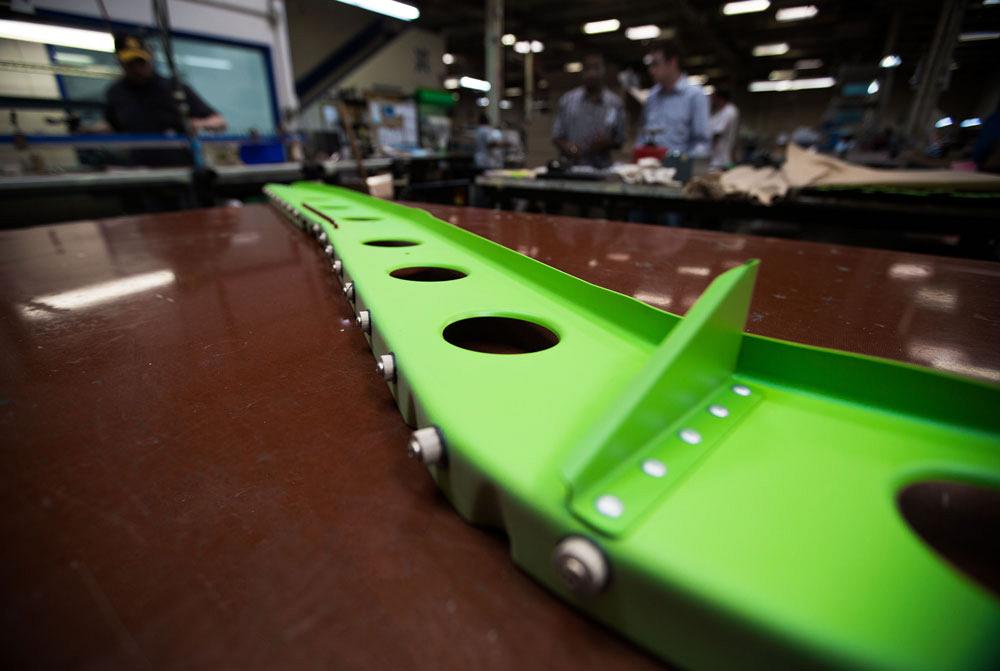
Figure 1
In a bid to solidify its fabricating business for the near term, Pioneer Industries is seeking out more complex aerospace part fabrication that is unlikely to be outsourced to competitors in other countries. Photos courtesy of Pioneer Industries.
“When I have an entry-level position to fill, I don’t struggle to fill it, and I’ve always struggled to fill those positions in other factories,” said Dan Hawkins, general manager, Pioneer Industries, Seattle.
That’s quite the statement for a metal manufacturer, while its peers constantly bemoan the lack of interest that people have in their open positions. It’s even more stunning considering how tight the labor market is in that area of the Pacific Northwest, where the unemployment rate was 3.1 percent in March.
But Pioneer Industries is not a typical manufacturer. Sure, it looks like any other large fabricating operation with machining, assembly, bending, laser cutting, painting, powder coating, punching, and waterjet cutting capabilities. It has 200 employees and about 110,000 square feet dedicated to manufacturing. About two-thirds of the work is dedicated to contract manufacturing/job shop activities at three plants in south Seattle: a plant at the top of a hill on Highland Park Way SW, a plant at the base of the hill beneath the organization’s headquarters, and a smaller facility down the hill, which is dedicated to the production of special aerospace parts. In 2017 Pioneer Industries produced more than 1.95 million parts across its plants.
Pioneer Industries’ business structure makes it different. It’s an affiliate of Pioneer Human Services (PHS), a social enterprise founded in 1963 to support people reentering the local community after serving time in prison. PHS operates the four residential re-entry centers in Washington state for those leaving the federal prison system. The centers help them to prepare for life as they return to their communities. PHS also provides support in the form of housing, substance abuse and mental health treatment, job-readiness workshops, parenting classes, and family reunification services for those individuals coming out of Washington state prisons and local jails. The organization served 9,947 people in Washington in 2017, according to the PHS annual report. The job-readiness efforts help to direct some of these people looking for a new start to Pioneer Industries.
Hawkins said that not a lot of people in the nearby manufacturing community know the real story about Pioneer Industries. They recognize the company because they may be competing for a lot of the same fabricating and machining work, but many think it’s a small shop that relies on free labor from those leaving prisons. They’d be surprised to learn that this large manufacturing organization, which offers a second-chance to some of its workers, is actually about to embark on an important second act designed to reposition it for future growth (see Figure 1).
Fulfilling the Mission
The one thing that doesn’t change is that Pioneer Industries still looks to support its parent organization’s mission.
“Where we differ from other companies is that we understand that a lot of people may come to us without a great skill set as far as being a candidate for employment,” Hawkins said. “But to us, it’s really not seen as a detriment. You have a person in front of you, and they’re here to learn. We have a business need. It’s a perfect match.”
People aren’t just showing up to Pioneer Industries for help based on a recommendation and a set of directions. They actually have to go through a PHS-sponsored job readiness program first. That gives them the opportunity to learn basic job-seeking skills, such as developing a resumé, writing cover letters, and practicing interview skills. The program organizers also put a focus on soft-skill development and cognitive thinking training to prepare these new job candidates for a life-changing opportunity that, frankly, others take for granted.
“Everybody coming here gets interviewed just like every other factory I’ve worked at,” Hawkins said. “But when they are being interviewed, nobody knows the background and there are no flags.” These interviewees that were a part of the PHS job-readiness program might be competing against job candidates that saw the help wanted ad on the internet.
“We’ll interview all these people for an opening, and whoever is the most promising, we’ll hire him or her,” Hawkins said. “So we don’t have quotas, and we don’t have to hit any marks.”
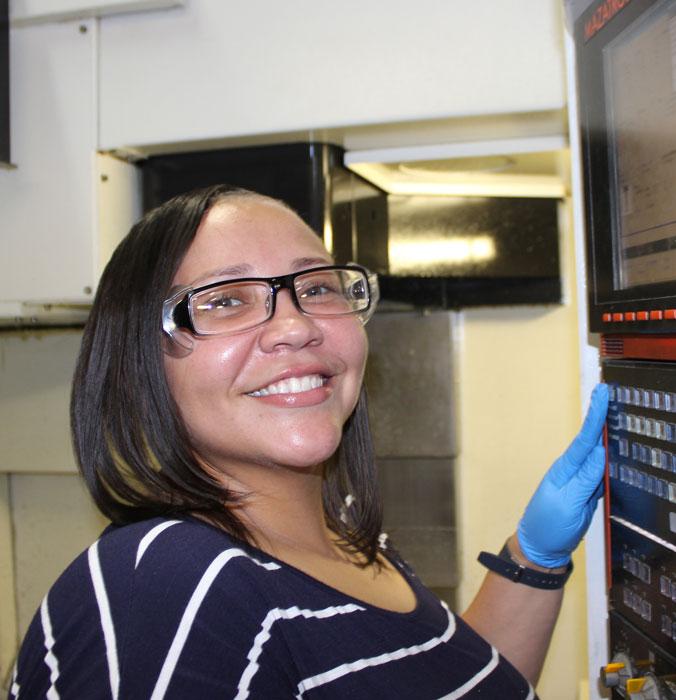
Figure 2
Pioneer Industries tries to have about 5 percent of our workforce in its machinist apprentice ship program at any one time. The helps to keep the talent pipeline full for future business expansion.
In the event that Pioneer Industries doesn’t have openings in its facilities, the candidates of the Road Map to Success program have options elsewhere. They might pursue culinary training as they prepare for life in a commercial kitchen or learn about warehousing and logistics management in a PHS-owned distribution center.
Hawkins said established workers can apply to be a part of the state’s Aerospace Joint Apprenticeship Committee (AJAC) apprenticeship program, which is partially funded by government and nonprofit sources (see Figure 2). It’s a four-year program, with a sheet metal and a machining track, that includes 1,000 hours of in-house training and one night class once a week over those four years. When completed, apprentices become journey-level machinists.
Pioneer Industries offers on-the-job training as well for new workers. Offerings included a blueprint-reading class, a geometric dimensioning and tolerancing class, and leadership training. Hawkins said funding for such training is available to all manufacturers, not just those with social service obligations.
As a whole, 63 percent of people employed across the PHS enterprise have a criminal history or are in recovery. Forty-four have been promoted into an advanced job, and 14 are a part of the aerospace apprenticeship program, according to the PHS annual report. And no one within Pioneer Industries or its sister organizations knows anything about these people’s backgrounds, unless they decide to share their stories with the public or co-workers. This is about enjoying a new start.
“We are really here to help them and get them to be successful,” said Laura Kimball, estimator and planning manager, Pioneer Industries. “And I think that the majority of them are really so grateful to have this opportunity that maybe we might be a little different because we don’t care about their backgrounds. We only care that they are working. We care that we’re giving them a fair opportunity. We really care about them.”
Kimball shared the story of a former Pioneer Industries employee who now works for a large aerospace company. After he served his time in prison, he came to work at the fab shop and spent several years working on the shop floor. He later earned experience as an estimator. The aerospace company was so jazzed to add him to their team that it looked beyond his past. They were pleased to have someone so experienced with manufacturing processes and different materials.
“There’s something about Pioneer that allows these people to have a foundation where they can go ‘I’m going to see who I am,’” Kimball said.
Fabricating a Future
While the people side of Pioneer Industries is sort of figured out, the company’s management team is charting a new future. Like any manufacturing company that looks at its employees as an extended family, Pioneer Industries is trying to find a fabricating future that will keep the company relevant and profitable. Simply put, a lot of the simple metal work that used to be common around Puget Sound is now done in Mexico and Asia.
That’s why Pioneer Industries is now going in new directions. Hawkins said that the job shop portion of the business is slowly shrinking as it looks to take on more contract manufacturing work, where the company has fixed contracts with an opportunity for renewal, which leads to more long-term partnerships. On the fabricating side of the business, the shop is taking on more aerospace work, and on the machining side, it is pursuing jobs focused on hard metals, such as titanium, INCONEL® alloy, and hardened stainless steel. It also isn’t afraid to take on complex and large jobs; Hawkins said any machined part up to a 36- by 24- by 6-inch threshold fits its manufacturing capabilities.
“These new opportunities open the doors for larger assemblies and more integrated structures with bigger bills of material,” Hawkins said. “They have better margins and longer contracts.”
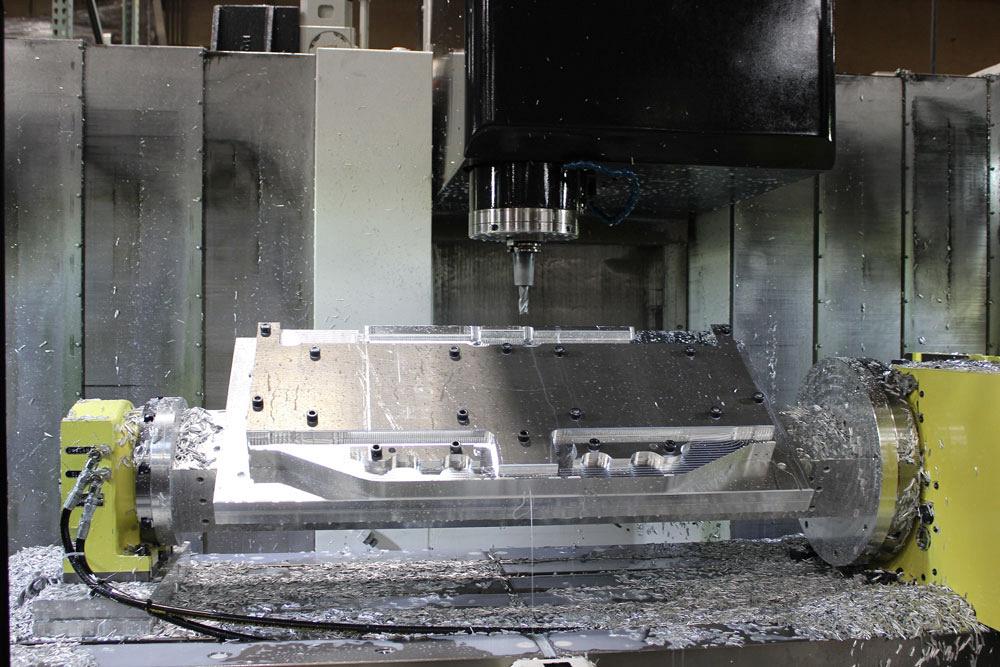
Figure 3
Two new horizontal milling centers have played an important role in Pioneer Industries winning more business.
Hawkins added that Pioneer Industries is perfectly positioned to pursue this type of work because of its location. Expertise is all around them as they pursue this more complex manufacturing future.
“It takes a team of vendors to support this type of work because rarely do customers want you to just machine a piece of titanium,” he said. “They want you to finish it. They want the appropriate certifications. They want very exotic bushings installed into the machined parts. They want it heat treated. It takes an area with a cluster of services to be able to deliver a part like that.”
To tackle these new initiatives, Pioneer Industries added a horizontal milling center (HMC) in 2016 and another one in 2017 (see Figure 3). It recently installed an automated linear pallet pull system to run between the two HMCs to speed up job changeover. Two recently won jobs for a cockpit rackmount panel and a monument instrument cluster panel are being manufactured in this cell. Both jobs begin as huge pieces of aluminum plate and wind up as a 6-pound part.
“It’s a machinist’s dream,” Hawkins said.
The shift to horizontal milling was made possible by the employees, he added.
“Before we did anything, we actually met in a conference room with our machinists and asked, ‘Who has run a horizontal mill?” he said. “Some people raised their hand, and from there, we created a group.”
The team comprised both new and experienced machinists. They got together every week to decide what parts would be best suited to the automation and how they would approach machine training and job scheduling.
The goal is to win more hard metal work and purchase an HMC just for those jobs. If the business in that area continued to grow, Pioneer Industries would add another HMC with pallet automation, creating a hard metal cell.
Pioneer Industries also added a turning center (see Figure 4) after an improbable encounter at the Paris Air Show. The company’s president and sales person at the time ran into someone from Seattle who was looking for a company to quote turning work for some INCONEL alloy parts. That connection led to a work contract, after the machinery was purchased, of course.
Hawkins said those parts are a good example of what Pioneer Industries can do and what competitors can’t. The INCONEL alloy can prove difficult to fixture because the parts can be marred easily, which is a no-no for this particular job. The shop floor and engineering staff figured out a way to keep the INCONEL alloy surface out of harm’s way during fixturing. Pioneer also is providing some secondary milling after the turning process.
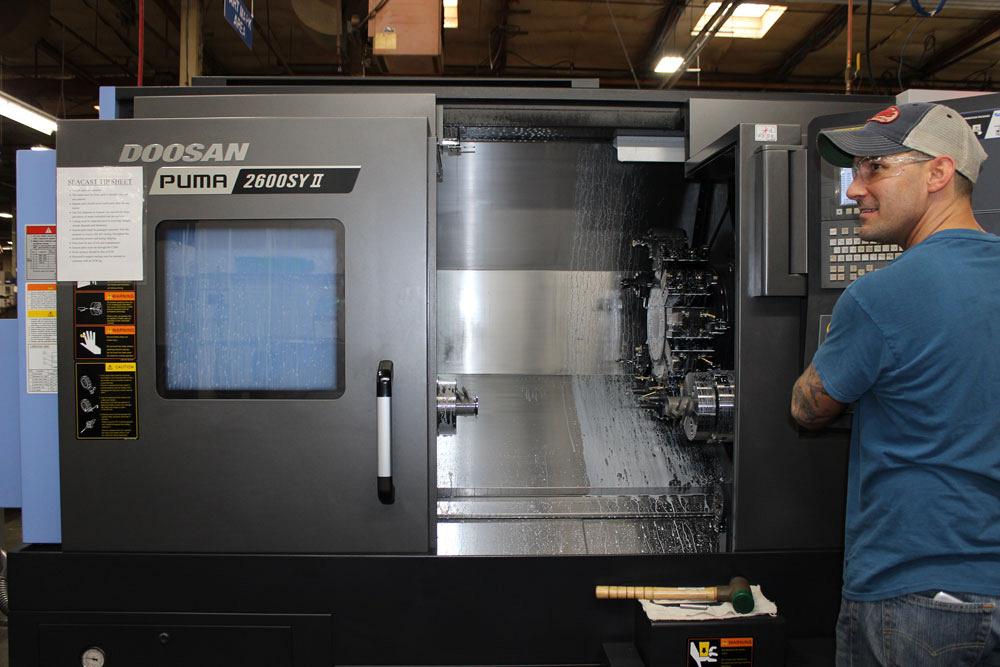
Figure 4
Turning is a new capability for Pioneer Industries after the recent installation of a Doosan Puma 2600SY II horizontal turning center.
Accompanying this new specialty work is some traditional fabricating. Pioneer Industries has a close working relationship with a nearby major lift manufacturer, and it delivers a truck of parts three times a day to the customer’s assembly lines. Parts range from tiny brackets to 3/8-in.-thick parts about the size of a small conference table. About a third of those laser-cut parts are formed on press brakes. All of those parts are placed in kanban containers to be shipped to the manufacturer.
While Pioneer Industries believes machining will be very important to its growth, the company still plans to invest in the traditional fabricating side. It could be adding a high-powered fiber laser to join its five other laser cutting machines (see Figure 5) in 2019, according to Hawkins.
So what does the governing board of directors think about this advanced equipment and automation? Doesn’t that mean fewer jobs to help support the PHS mission? Hawkins said the organization had to confront that very issue, but did so successfully. He pointed out that Pioneer Industries needed to move forward and stay current with technology, or there would be no jobs for anyone.
That’s when the board of directors made a decision to support the team to make Pioneer Industries one of the most competitive shops in the area. But the board also recognized the need to create more job opportunities outside of the manufacturing world. That led to additional focus on the culinary trade and logistics businesses.
Maybe that’s another lesson the world can learn from Pioneer Industries. Manufacturing may not be able to single-handedly employ the masses and guarantee a steady income for all, but it still plays an integral part for a large segment of people in any market-based economy. We shouldn’t take manufacturing for granted.
Pioneer Industries Manufacturing, http://pioneerhumanservices.org/manufacturing-enterprises/pioneer-industries-manufacturing/manufacturing
About the Author

Dan Davis
2135 Point Blvd.
Elgin, IL 60123
815-227-8281
Dan Davis is editor-in-chief of The Fabricator, the industry's most widely circulated metal fabricating magazine, and its sister publications, The Tube & Pipe Journal and The Welder. He has been with the publications since April 2002.
subscribe now

The Fabricator is North America's leading magazine for the metal forming and fabricating industry. The magazine delivers the news, technical articles, and case histories that enable fabricators to do their jobs more efficiently. The Fabricator has served the industry since 1970.
start your free subscription- Stay connected from anywhere

Easily access valuable industry resources now with full access to the digital edition of The Fabricator.

Easily access valuable industry resources now with full access to the digital edition of The Welder.

Easily access valuable industry resources now with full access to the digital edition of The Tube and Pipe Journal.
- Podcasting
- Podcast:
- The Fabricator Podcast
- Published:
- 04/16/2024
- Running Time:
- 63:29
In this episode of The Fabricator Podcast, Caleb Chamberlain, co-founder and CEO of OSH Cut, discusses his company’s...
- Trending Articles
Tips for creating sheet metal tubes with perforations

Supporting the metal fabricating industry through FMA

JM Steel triples capacity for solar energy projects at Pennsylvania facility

Fabricating favorite childhood memories

Omco Solar opens second Alabama manufacturing facility

- Industry Events
16th Annual Safety Conference
- April 30 - May 1, 2024
- Elgin,
Pipe and Tube Conference
- May 21 - 22, 2024
- Omaha, NE
World-Class Roll Forming Workshop
- June 5 - 6, 2024
- Louisville, KY
Advanced Laser Application Workshop
- June 25 - 27, 2024
- Novi, MI
























